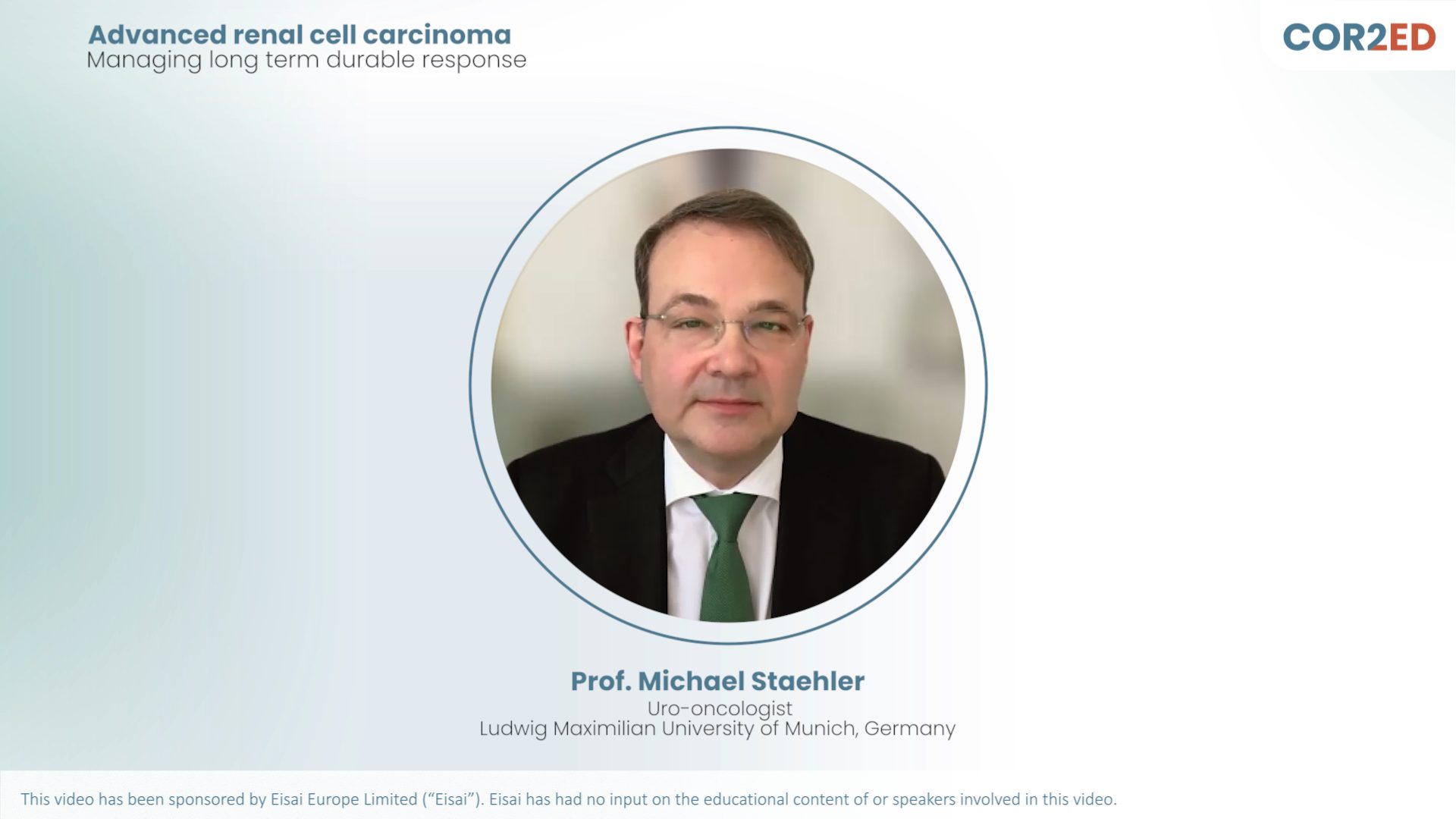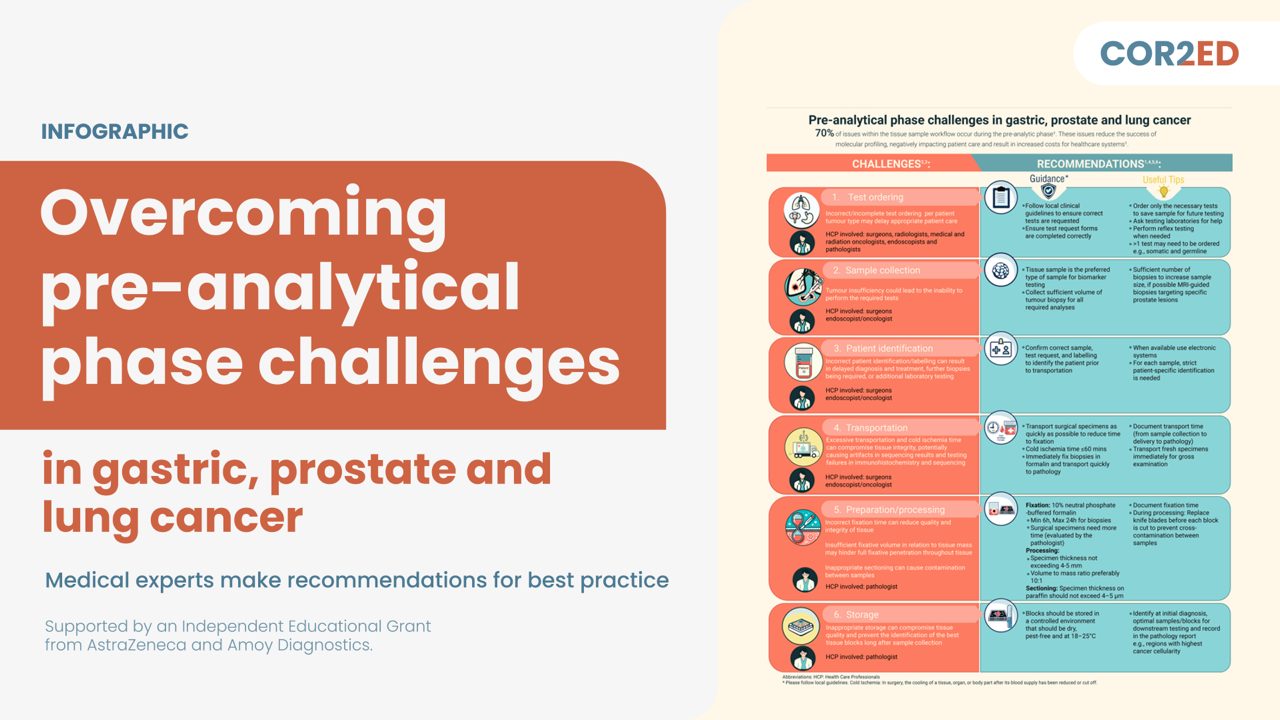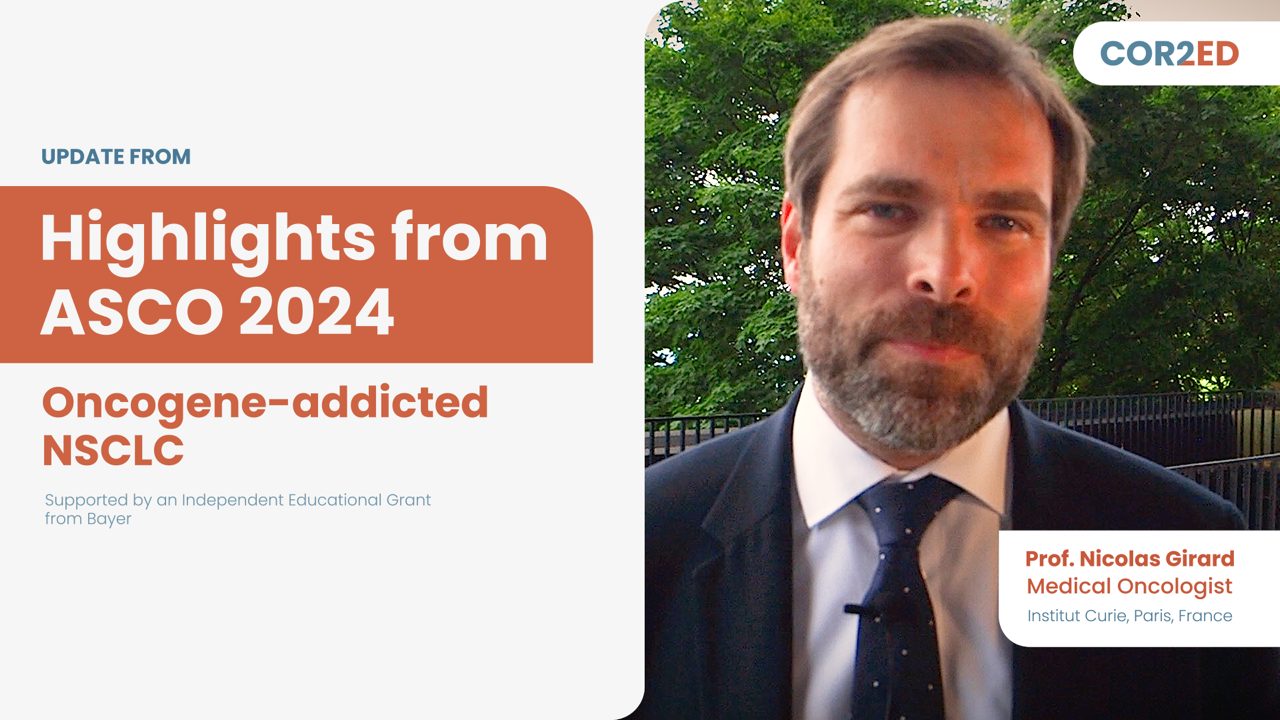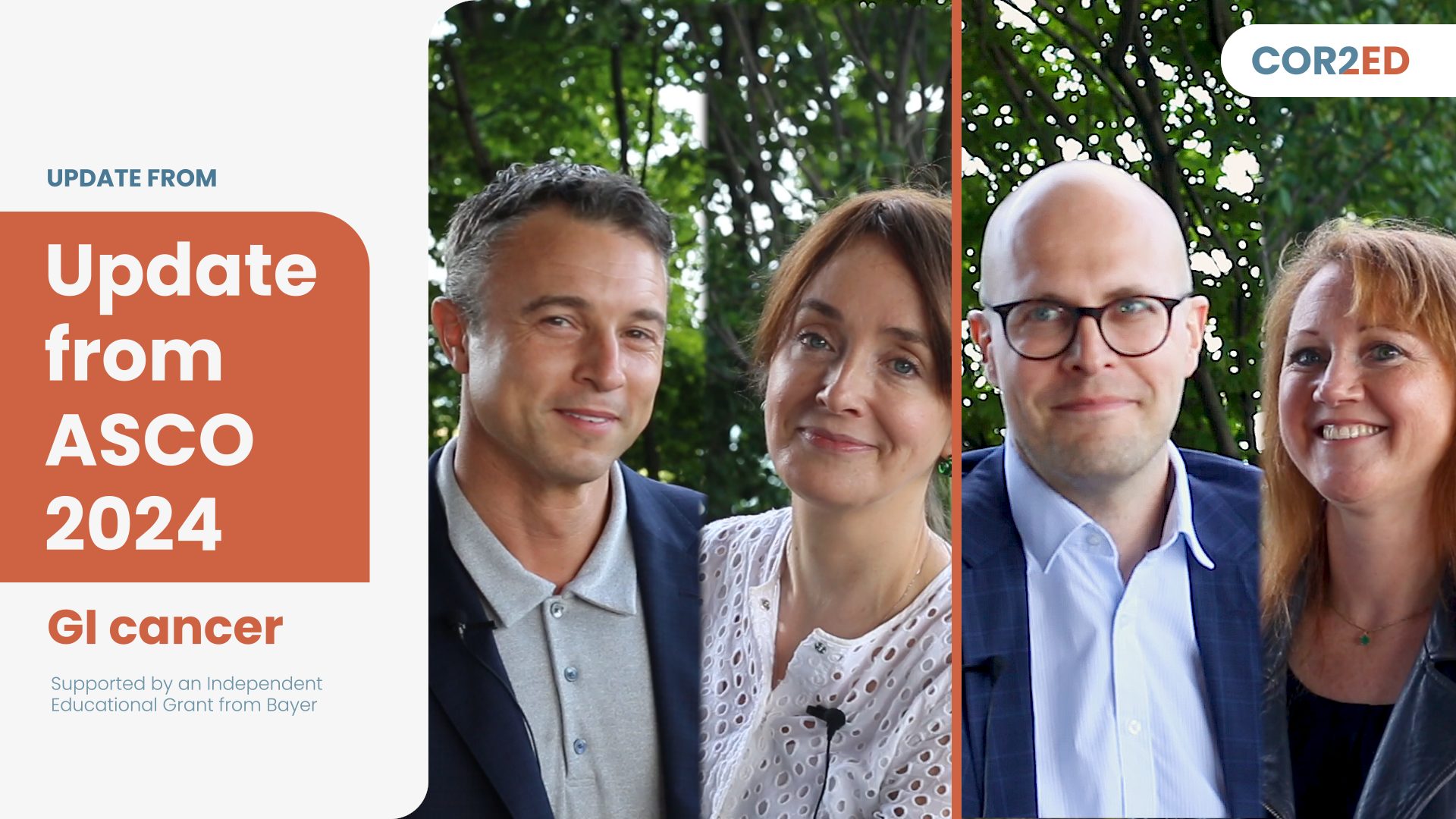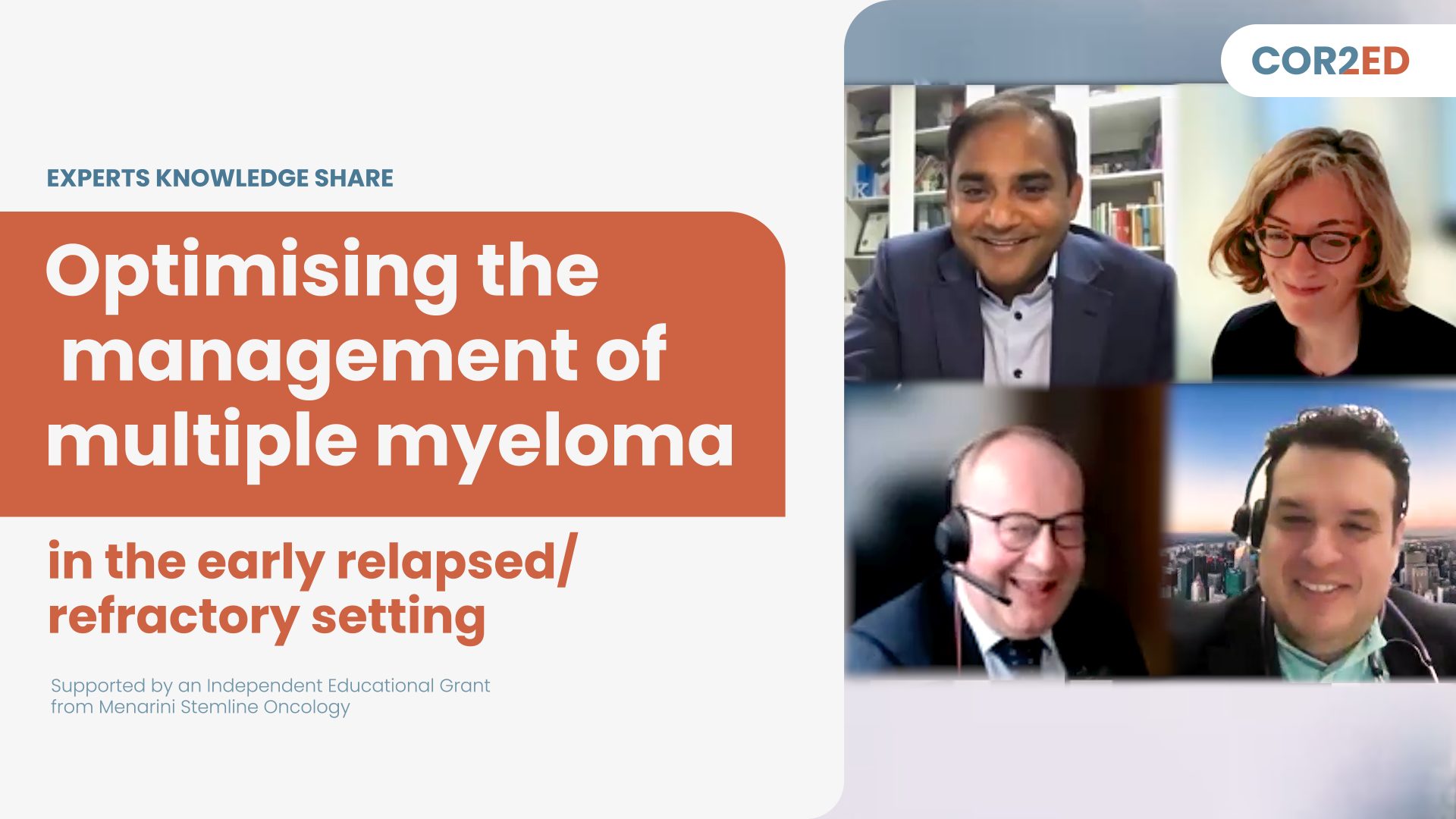Episode 2: Clinical implementation of PARPi and NHA combination therapy for patients with mCRPC – a US and EU perspective
Transcript
Welcome and thank you for listening to this podcast from COR2ED Independent Medical Education. In this episode, you will hear from internationally renowned experts, Dr. Elena Castro and Dr. Neal Shore, when they discuss how combination therapy of PARP inhibitors and novel hormonal agents could be implemented into their clinical practice for prostate cancer patients. They discuss which patients to consider for the combination treatment, how to manage hormonal sequencing and other practical considerations.
This podcast is an initiative of COR2ED and developed by GU CONNECT, which is a group of international experts working in the field of GU Oncology. The podcast is supported by an independent educational grant from AstraZeneca. The views expressed are the personal opinions of the experts and they do not necessarily represent the views of the experts' organisations or the rest of the GU CONNECT Group. For experts disclosures on any conflict of interest please visit the COR2ED website. Now, with that being said, let's get started.
Neal Shore
Hello everyone and welcome to our second podcast in our series covering PARP inhibitors for prostate cancer. Today we're going to discuss the clinical implementation of PARP inhibitors in combination with novel hormonal agents for prostate cancer patients. It's a pleasure to be here. I'm Neal Shore. I'm a uro-oncologist. I'm the Chief Medical Officer of urology and surgical oncology at GenesisCare in the U.S. and the medical director of Carolina Urologic Research Center. It's a great pleasure and privilege for me to be joined today again with my dear friend and colleague, Dr. Elena Castro. Elena, would you please introduce yourself?
Elena Castro
Hi, Neal. It is my pleasure to be here with you. I'm a medical oncologist at Hospital Universitario 12 de Octubre in Madrid, Spain, and I treat mostly patients with advanced prostate cancer. And my research is focused in this field and in cancer genetics and I'm delighted to be here discussing with you PARP inhibitors in combination as this is a very hot topic.
Neal Shore
Yeah. Thank you so much, Elena. You know, in our first podcast, we just talked about the use of monotherapy PARP inhibitors, olaparib and rucaparib for our mCRPC population.
You know, it's great to have this opportunity to talk about combinations. But really now exciting data has been presented and published at major congresses. The PROPEL Data, which looked at an all-comers population for mCRPC first line therapy, abiraterone and olaparib versus a control of abiraterone demonstrated a benefit of combining olaparib and abiraterone in an all-comers population. It's really great to see that the EMA and CHMP have had a positive recommendation for the data that was presented in PROPEL. So, the data for PROPEL is in front of FDA now as well.
And then we also have the MAGNITUDE trial, which is a little bit more of a complicated trial, but nonetheless looked at combining niraparib PARP inhibitor with abiraterone versus abiraterone and also saw positive efficacy in the biomarker positive population. A particularly more significant hazard ratio for the patients who were BRCA alteration positive, both BRCA1 and BRCA2. So, there were some nuanced differences in the trial design as well as some of the inclusion criteria, which I think we'll want to talk about.
And most recently, we now have a correlative trial, the TALAPRO-2 which looked at talazoparib and enzalutamide as opposed to abiraterone in an all-comers population and the public statement press release at the end of 2022 has clearly stated that it's a successful trial and we eagerly await the results which will be presented in plenary presentation at ASCO GU 2023. So, I think that's really super exciting to see that data set.
And so now we have two trials where we have combination of an androgen receptor targeted agent, abi (abiraterone), enza (enzalutamide), with olaparib and talazoparib respectively, showing benefit certainly from an rPFS standpoint in an all-comers population. So, this is super exciting.
It leads to a lot of questions. Are these combinations equally well-tolerated? Are the efficacy end points comparable? Are they similar in terms of monitoring? What about some of the overall tolerability and safety issues? Some of these are really interesting areas of debate. And then ultimately, how do we most importantly think about using combination of two therapies with different novel mechanisms of action? Why would they necessarily lead to a benefit in allcomers population within the construct of lessening resistance to the androgen receptor for patients who would normally develop resistance by adding a PARP inhibitor and then likewise, how to create further PARP sensitivity to patients who would not necessarily have at baseline an HRR alteration.
So, a lot right there to unpack. I think it's fantastic to have you weigh in and give your thoughts on this Elena, you've spent so much time reviewing these trials.
Elena Castro
Yes, there is a lot of data and that generates a lot of questions actually. The first is, as you just mentioned, whether it would be the same to have androgen receptor targeting agent that inhibits the production of androgens. Whether these would be comparable in these combinations to an agent that inhibits directly the androgen receptor, whether this synergy that is created with a PARP inhibitor could be different if we are discussing different, not mechanisms of action but somehow these are different molecules with different mechanisms of action and perhaps the effect is different.
The second thing is that the PARP inhibitors are not the same and the PARP inhibitors were used, some of them, at the regular dose whilst others were used at a reduced dose because otherwise they will be not well tolerated. And perhaps this reduction in the PARP inhibitor also causes a decrease in the effect in this synergy. And this could be behind the differences that are being observed between MAGNITUDE for instance and PROPEL and TALAPRO-2 with regards to patients without HRR alterations, that in MAGNITUDE no benefit was noted and then that cohort of patients was not allowed to continue with the combination. And in PROPEL and TALAPRO-2, the benefit seems to be observed in all patients with and without alteration.
That said, the analysis of the PROPEL data presented at ESMO this year reported a clear difference in the benefit in rPFS, because this is the only data that has been presented so far, a clear difference between patients with BRCA alterations in which there it was a very clear benefit in rPFS with a hazard ratio around 0.2 with the benefit noted in patients with other HRR alterations, including also the BRCA but the HRR group that was around 0.5 hazard ratio and in patients without any alterations in which their hazard ratio was almost 0.8.
So, it's a very different benefit I would like to see how that translates in an overall survival benefit because if we are affecting the biology of the tumour somehow, will that result in a later alteration of the biology? Will that affect the response to further treatments, and will that have an impact in the survival of these patients? We don't know yet.
With regards to side effects, there's not overlapping toxicity between the hormonal agents and the PARP inhibitors, but the PARP inhibitors per se are associated with anaemia and nausea, and I think it will be acceptable for patients in which we expect a great benefit. But perhaps for patients who may benefit less, this is a discussion that we will clearly have to have with our patients, whether they will accept the toxicity from the combination.
So, I think there is still a lot that we need to learn from these trials, but it poses very interesting questions.
Neal Shore
Yeah, I fully agree. It seems to be remarkable data at least we saw early on in PROPEL that's been presented. Eagerly await the breakdown of the BRCA patients versus the other HRR alterations versus the non-HRR. As you point out, the hazard ratios are positive, but there are differentials. We certainly look forward to seeing the long-term or the more advanced analysis of survival data.
I completely agree with you that there is some additional toxicity whenever you combine, but I think it'll be very, very manageable. There may be some differences in terms of the frequency of taking pills. For example, I believe tala (talazoparib) is QD as opposed to BID, and of course enza (enzalutamide) is QD as opposed to abiraterone, which requires prednisone BID and there are some differences.
And obviously so the safety and tolerability well known to either abi (abiraterone) versus enza (enzalutamide) and additionally, there may be some nuanced differences amongst the PARP inhibitors regarding impact of their myelosuppression, perhaps on platelet count versus anaemia. Some of our colleagues may see some differences in even some of the GI toxicities, but a big advance in terms of having an opportunity to offer a patient who wants to have a very proactive approach towards treating their biology, as you say, with a complementary mechanism of action approach by adding a PARP to an AR and so there's this ongoing debate as to, you know, the combination and why it should have benefit in patients who don't have HRR mutation, whether it by tissue or by blood based testing.
You know, Elena, I'm curious. You know, one of the things that gets brought up is, okay, well, if it's beneficial in all-comers and EMA just gave a positive recommendation for a combination of olaparib and abiraterone, its pending FDA approval, what do you tell a clinician who says, well, if I'm going to use it in first-line mCRPC combination, do I still need to test? Do I still need to get genetic sequencing?
Elena Castro
I personally think that we will need that data because that will help us to inform the patient better and to inform the patient about the chances of responding to this combination. As we just mentioned, the probability or the efficacy of the combination depends on whether the patient has a BRCA alteration or other HRR alterations or no HRR alterations so I think it would be useful.
I also agree that testing is sometimes a struggle so if we have this combination approved, in many cases it would be difficult to test and we will still have the opportunity of using the combination without testing. But if you have the opportunity, I think we should continue to test.
Neal Shore
What about this one? Here's a tricky one. I think you and I both agree on this, but I think our audience wants to hear this. So, I present with low or high volume mHSPC, and, you know, maybe I was initiated on couplet therapy with an ADT and an ARTA or even maybe I had triplet therapy, ADT, doce (docetaxel) and an ARTA and now I need treatment for my first line mCRPC. And I'm on ADT and abi (abiraterone) or ADT and enza (enzalutamide) and let's assume there's in a theoretical world we have approval of combination tala (talazoparib) and enza (enzalutamide) or abi (abiraterone) and olaparib.
What are your thoughts now on just maintaining the abi (abiraterone) or the enza (enzalutamide) for this mHSPC patient who now requires first-line mCRPC therapy? Would you just add olaparib or talazoparib respectively, for the patient who was on abi (abiraterone) or enza (enzalutamide)? Or do we need more trial data to look at that?
Elena Castro
Oh, definitely we need more data. We need more information because we know that once patients have become resistant to one hormonal agent, the probability of responding to a second one are very small. What we don't know at present is whether the addition of the PARP inhibitor may help to further silence the androgen receptor pathway, and that could really improve the chances of responding to the switch in the hormonal agents or even we don't really know whether we would need to change from one ARTA to a second one or whether we could continue with the same one and just add the PARP inhibitor on top of them.
With respect to that, I think it will be different if the patient is progressing just by PSA than if the patient is also progressing with radiographic and new lesions. So perhaps in that situation, the addition of the PARP inhibitor, if the patient doesn't have any HRR alteration, will not result in a benefit. But as you said, we need more data.
Neal Shore
I completely agree. Maybe just another opportunity for you to give your thoughts. It's more of a theoretical, a biologic construct regarding why the combination of an ARTA and a PARP inhibitor would be of value in an all-comer population, particularly in the patients who don't have germline or somatic HRR mutation. Do you think it's an enhancement or a lessening of AR resistance or more so, an enhancement of PARPness or BRCAness, as some have called it?
Elena Castro
I don't know of course. The truth is that there is a crosstalk, there is a very clear correlation between the androgen receptor pathway and the DNA repair pathway. And PARP also promotes the expression of AR dependent genes and at the same time androgen deprivation causes overexpression of PARP. So, I don't really know whether one of the two mechanisms will be more predominant than the other one. What do you think?
Neal Shore
Yeah, I think it's an area that's hotly debated. Maybe there are some other mutational alterations that we're not even fully aware of. So, I think it's super exciting. I think we've addressed previously the importance, it's still important to test, but then now we have an opportunity, especially in our patients who are BRCA positive. I mean the hazard ratio in combination is just remarkable. The rPFS is remarkable and I'm sure the OS will eventually be correlative to that.
As you said earlier too, there are some clear differences in tolerability and side effects and some of the monitoring nuances.
Neal Shore
So, thank you and really great pleasure to speak with you on this topic. And it's really great for our colleagues across the globe, and I mean for patients, having an opportunity to delay progression of disease, ideally to have survival benefit. And even though we're combining therapies and there's always a risk of a little bit more toxicity, the toxicity I think is going to be manageable. And for our patients who are fit and accessibility is not an issue, cost will hopefully not be too much of an issue, we can do better for our patients in the clinic. The ultimate goal.
So, thanks again Elena for being with me today. It was a great pleasure.
Elena Castro
Thank you, Neal. It was great.
We hope you found this podcast informative and enjoyable. If you like this episode, you should look on the COR2ED channel for more. In particular, look out for another podcast with these experts, Dr Castro and Dr Shore, where they discuss how they implement PARP inhibitor monotherapy in clinical practice for their prostate cancer patients. Make sure to listen to that one too.
Also, don't forget to rate this episode on the COR2ED website and share our podcasts on social media or maybe with your colleagues. Thanks for listening and see you next time.






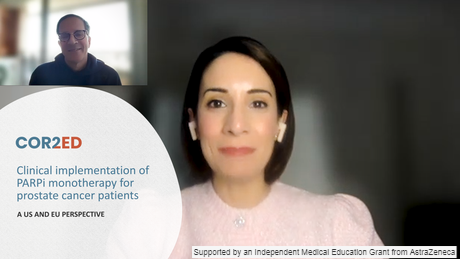
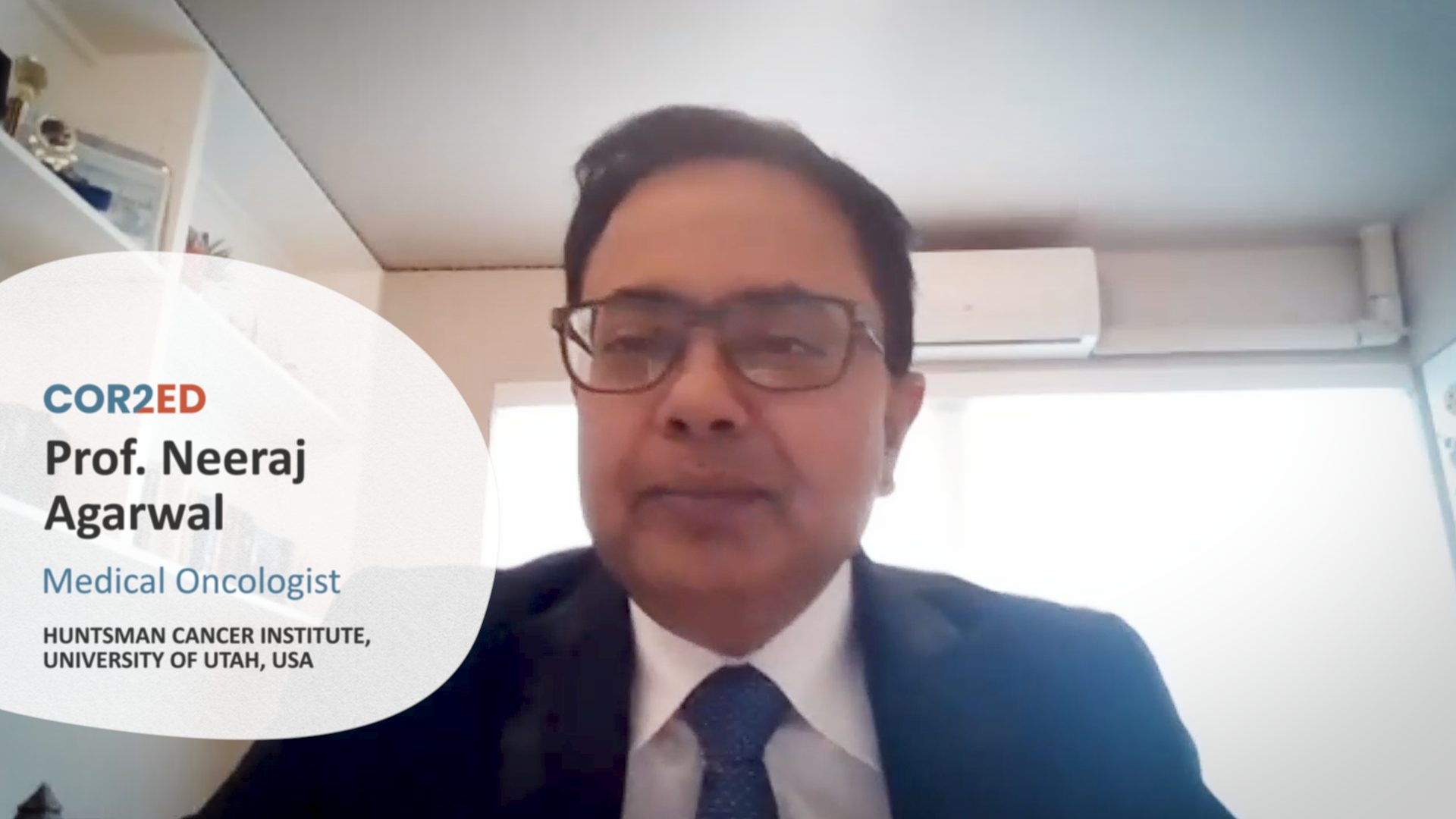


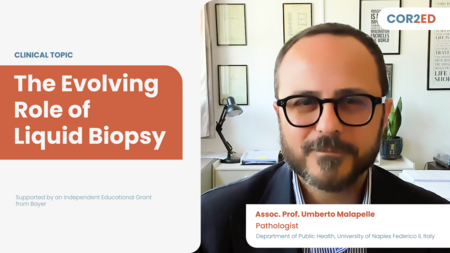
 Downloadable
Downloadable  5 MIN
5 MIN
 Jul 2024
Jul 2024 